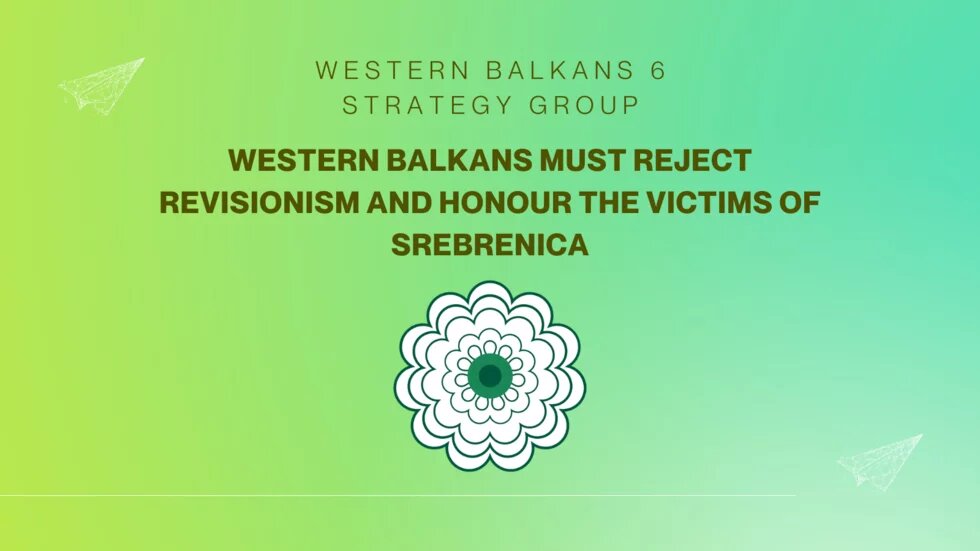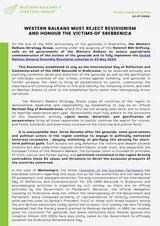On the eve of the 30th anniversary of the genocide in Srebrenica, the Western Balkans Strategy Group, working under the auspices of the Heinrich Böll Stiftung, calls on all governments of the Western Balkans to ensure appropriate commemoration of the victims of the genocide and to fully implement the United Nations General Assembly Resolution adopted on 23 May 2024.

This Resolution established 11 July as the International Day of Reflection and Commemoration of the 1995 Genocide in Srebrenica, to be observed annually, and explicitly condemns denial and distortion of the genocide as well as the glorification of individuals convicted of war crimes, crimes against humanity, and genocide. It further stresses the need to bring all perpetrators to justice, underscores the importance of continuing efforts to find and identify the remaining victims, and calls on Member States to stick to the established facts rather than ideologically driven narratives.
The Western Balkans Strategy Group urges all countries of the region to demonstrate leadership and responsibility by establishing 11 July as an official National Day of Remembrance, where this has not already been done, and to ensure its dignified observance each year. Governments must fully adhere to the provisions of this Resolution, actively reject denial, distortion, and glorification of perpetrators, bring all those responsible to justice, continue the search for victims, and foster education and awareness to preserve the historical and judicial facts.
It is unacceptable that, three decades after the genocide, some governments and political actors in the region continue to engage in politically motivated historical revisionism - denying, minimizing, or glorifying this atrocity for short-term political gains. Such actions not only dishonour the victims and deepen societal divisions but also undermine regional reconciliation, erode trust, and jeopardize the European future of the Western Balkans. The European Union is founded on principles of truth, justice, and human dignity, and persistent revisionism in the region directly contradicts these EU values and threatens to derail the accession prospects of the countries concerned.
In the case of Montenegro, the latest resolution of the European Parliament has expressed concern regarding this issue, but so far the authorities are not taking this EP assessment with adequate attention. The only commemoration of the International Day of Reflection and Commemoration for the 1995 Genocide in Srebrenica and accompanying activities is organized by civil society, as there are no official activities by the Government or Parliament. Moreover, the official delegation traveling to Srebrenica does not reflect the heterogeneity of the Government and Parliament, being composed primarily of representatives of minority communities, while parties close to Serbia’s President Vučić or those with broad support among the pro-Serbian electorate visibly ignore the occasion. Civil society has also formally requested that the literary award granted to Radovan Karadžić, in 1993, be revoked, given his conviction for genocide, but state institutions have likewise ignored this initiative. Almost 100 CSOs have also jointly called on the Government to officially establish the Srebrenica Remembrance Day.
In Serbia, the UNGA resolution was largely ignored following the infamous live streaming of the voting. The government has shown no willingness to engage in meaningful commemoration or to confront denial and glorification of perpetrators. Recent developments illustrate this worrying trend: recently, Serbia’s High Court acquitted Bosnian Serb commander Milenko Živanović of war crimes committed during the Srebrenica genocide, despite evidence and charges relating to his role as commander of the Drina Corps during the July 1995 massacre. This verdict has been strongly criticized by human rights CSOs and legal experts as a dangerous precedent that undermines justice and shields perpetrators. In another case, a Belgrade court in May ruled against the Informer news portal for defaming an activist critical of genocide denial, but failed to order removal of the offensive article, which further highlighted the lack of decisive action against hate speech and revisionism. Meanwhile, civil society remains at the forefront of challenging denial and promoting remembrance, while the government largely remains silent. Symbolically, opposition MPs (Movement of Free Citizens and Sandzak Democratic Action Party) submitted a motion to the Serbian Parliament to adopt the UNGA resolution, which is unlikely to pass but still significant. At the same time, nationalist and radical groups announced organizing a provocative gathering on 11 July under the slogan “Srebrenica Liberation Day,” demonstrating the persistence of toxic narratives in public space, as well as protection of the state, as this is not forbidden.
In Bosnia and Herzegovina, the authorities continue to fall short of fully implementing the UNGA Resolution. Once again this year, 11 July will be officially marked only in the Federation, as ministers from the Republika Srpska entity refuse to recognize it at the state level. Denial and glorification of convicted war criminals persist, with most cases going unpunished despite the first prison sentence for genocide denial delivered in 2025. The adoption of the Resolution has even been misused to amplify denial, with media close to Republika Srpska and Serbia spreading narratives that relativize or deny the genocide. Republika Srpska authorities amended the history curriculum to distort facts about the war, which the Constitutional Court of B&H annulled as unconstitutional. Senior officials, including RS President, Milorad Dodik, continue to insult victims and question the number of victims, while families are often denied the right to commemorate at sites of atrocities within RS. Despite these setbacks, the Srebrenica Memorial Center and its partners have strengthened remembrance through exhibitions, plays, documentaries, an animated film on the genocide, and pioneering research on the suffering of Roma during the war, contributing to truth-telling and reconciliation.
The Western Balkans Strategy Group calls on all governments of the region to act in the spirit of the UN Resolution, to honour the victims of Srebrenica through concrete measures and consistent public narratives, and to decisively reject and sanction any attempts to deny, relativize, or glorify the genocide. Only by confronting the truth, preserving the memory, and ensuring accountability can the region prevent the recurrence of such horrors and advance toward a future anchored in human rights, peace, and a shared European path. Silence and denial are not neutrality - they are complicity.
